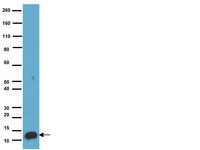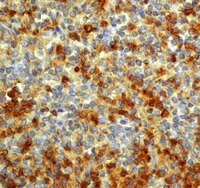SncRNA715 Inhibits Schwann Cell Myelin Basic Protein Synthesis.
Müller, C; Hochhaus, NM; Fontana, X; Luhmann, HJ; White, R
PloS one
10
e0136900
2015
Show Abstract
Myelin basic proteins (MBP) are major constituents of the myelin sheath in the central nervous system (CNS) and the peripheral nervous system (PNS). In the CNS Mbp translation occurs locally at the axon-glial contact site in a neuronal activity-dependent manner. Recently we identified the small non-coding RNA 715 (sncRNA715) as a key inhibitor of Mbp translation during transport in oligodendrocytes. Mbp mRNA localization in Schwann cells has been observed, but has not been investigated in much detail. Here we could confirm translational repression of Mbp mRNA in Schwann cells. We show that sncRNA715 is expressed and its levels correlate inversely with MBP in cultured Schwann cells and in the sciatic nerve in vivo. Furthermore we could reduce MBP protein levels in cultured Schwann cells by increasing the levels of the inhibitory sncRNA715. Our findings suggest similarities in sncRNA715-mediated translational repression of Mbp mRNA in oligodendrocytes and Schwann cells. | 26317513
 |
Spinal nerve ligation decreases γ-aminobutyric acidB receptors on specific populations of immunohistochemically identified neurons in L5 dorsal root ganglion of the rat.
Engle, MP; Merrill, MA; Marquez De Prado, B; Hammond, DL
The Journal of comparative neurology
520
1663-77
2012
Show Abstract
This study examined the distribution of γ-aminobutyric acid (GABA)(B) receptors on immunohistochemically identified neurons, and levels of GABA(B(1)) and GABA(B(2)) mRNA, in the L4 and L5 dorsal root ganglia (DRG) of the rat in the absence of injury and 2 weeks after L5 spinal nerve ligation. In uninjured DRG, GABA(B(1)) immunoreactivity colocalized exclusively with the neuronal marker (NeuN) and did not colocalize with the satellite cell marker S-100. The GABA(B(1)) subunit colocalized to greater than 97% of DRG neurons immunoreactive (IR) for neurofilament 200 (N52) or calcitonin gene-related peptide (CGRP), or labeled by isolectin B4 (IB4). Immunoreactivity for GABA(B(2)) was not detectable. L5 spinal nerve ligation did not alter the number of GABA(B(1)) -IR neurons or its colocalization pattern in the L4 DRG. However, ligation reduced the number of GABA(B(1)) -IR neurons in the L5 DRG by ≈38% compared with sham-operated and naïve rats. Specifically, ligation decreased the number of CGRP-IR neurons in the L5 DRG by 75%, but did not decrease the percent colocalization of GABA(B(1)) in those that remained. In the few IB4-positive neurons that remained in the L5 DRG, colocalization of GABA(B(1)) -IR decreased to 75%. Ligation also decreased levels of GABA(B(1)) and GABA(B(2)) mRNA in the L5, but not the L4 DRG compared with sham-operated or naïve rats. These findings indicate that the GABA(B) receptor is positioned to presynaptically modulate afferent transmission by myelinated, unmyelinated, and peptidergic afferents in the dorsal horn. Loss of GABA(B) receptors on primary afferent neurons may contribute to the development of mechanical allodynia after L5 spinal nerve ligation. | 22120979
 |
RAGE-TXNIP axis is required for S100B-promoted Schwann cell migration, fibronectin expression and cytokine secretion.
Sbai, O; Devi, TS; Melone, MA; Feron, F; Khrestchatisky, M; Singh, LP; Perrone, L
Journal of cell science
123
4332-9
2010
Show Abstract
During peripheral nerve injury, Schwann cells (SCs) adopt a migratory phenotype and remodel the extracellular matrix and provide a supportive activity for neuron regeneration. SCs synthesize neurotrophic factors and cytokines that are crucial for the repair of the injured nerve. The receptor for advanced glycation end products (RAGE) and its ligand S100B, which are secreted by SCs, are required for the repair of the injured peripheral nerve in vivo. However, the precise intracellular pathways involved have not been completely elucidated. Here, we show that RAGE-induced S100B secretion involves the recruitment of S100B in lipid rafts and caveolae. Moreover, we demonstrate for the first time that RAGE induces the expression of thioredoxin interacting protein (TXNIP) in SCs and the injured sciatic nerve in vivo. TXNIP is involved in the activation of p38 MAPK, CREB and NFκB in SCs. TXNIP silencing partially inhibits RAGE-induced SC migration and completely abolishes RAGE-induced fibronectin and IL-1β expression. Our results support a model in which TXNIP mediates in part RAGE-induced SC migration and is required for the expression of provisional ECM and pro-inflammatory IL-1β. We provide new insight on the role of the SC RAGE-TXNIP axis in the repair of injured peripheral nerves. | 21098642
 |
Giant schwannoma of the cheek--a comprehensive histological and immunohistochemical description of a rare tumour.
Mariusz Gajda, Olaf Zagólski, Agnieszka Jasztal, Grzegorz J Lis, Dariusz Adamek, Jan A Litwin, Mariusz Gajda, Olaf Zagólski, Agnieszka Jasztal, Grzegorz J Lis, Dariusz Adamek, Jan A Litwin
Polish journal of pathology : official journal of the Polish Society of Pathologists
60
52-6
2009
Show Abstract
Schwannoma is a benign tumour originating from Schwann cells forming sheaths of peripheral nerves. Its location in the oral cavity, and particularly in the cheek, is very rare. A large tumour (5 cm) was surgically removed from the left cheek of a fifty-five-year-old man and pathological examination revealed schwannoma with Antoni A and B patterns. The tumour was investigated using immunofluorescence and histochemical stainings. It showed positive immunostaining for S-100, PGP 9.5, NSE, collagen IV, laminin, merosin and vimentin. No immunofluorescence for GFAP, NPY and CGRP was observed. Cells of the macrophage family (CD68-immunopositive) were scattered in the connective tissue. Neither B (CD20+) nor T (CD3+, CD8+) lymphocytes were found. The capillary network was revealed by CD34 immunostaining. SMA immunoreactivity was observed in walls of larger blood vessels but not in tumour cells. The tumour contained numerous mast cells visualized by thionin staining and an abundance of collagen fibres revealed by picrosirius red. | 19670705
 |
Immunohistochemical visualization of neurons and specific glial cells for stereological application in the porcine neocortex.
Lise Lyck, Jacob Jelsing, Pia Søndergaard Jensen, Kate Lykke Lambertsen, Bente Pakkenberg, Bente Finsen
Journal of neuroscience methods
152
229-42
2006
Show Abstract
The pig is becoming an increasingly used non-primate model in basic experimental studies of human neurological diseases. In spite of the widespread use of immunohistochemistry and cell type specific markers, the application of immunohistochemistry in the pig brain has not been systematically described. Therefore, to facilitate future stereological studies of the neuronal and glial cell populations in experimental neurological diseases in the pig, we established a battery of immunohistochemical protocols for staining of perfusion fixed porcine brain tissue processed as free floating cryostat-, vibratome- or paraffin sections. Antibodies against NeuN, GFAP, S100-protein, MBP, CNPase, CD11b, CD68 (KP1), CD45 and Ki67 were evaluated, and all except CD68 and CD45 resulted in staining of high quality in either type of tissue. Each staining was evaluated with respect to specificity and sensitivity in identification of the individual cells, and for penetration of the staining and maintenance of section thickness above 25 microm, necessary for stereological cell counting. In the cases of NeuN, CNPase, CD11b and Ki67 the staining met the demands to be applicable in stereological analyses using the optical disector. In conclusion, all protocols will be applicable in studies of pathological and neurochemical changes in the porcine brain, and a few protocols applicable for stereology. | 16269187
 |
Satellite cells of dorsal root ganglia are multipotential glial precursors.
Svenningsen, Asa Fex, et al.
Neuron Glia Biol., 1: 85-93 (2004)
2004
| 18634609
 |
Schwann cell apoptosis in the postnatal axotomized sciatic nerve is mediated via NGF through the low-affinity neurotrophin receptor.
Petratos, Steven, et al.
J. Neuropathol. Exp. Neurol., 62: 398-411 (2003)
2003
Show Abstract
Schwann cell death is a developmentally regulated phenomenon and is also induced after peripheral nerve axotomy in neonatal rodents. In this study, we explored whether ligand-induced activation of the low-affinity neurotrophin receptor (p75(NTR)) is responsible for inducing Schwann cell death in vivo. Administration of exogenous nerve growth factor (NGF) to the axotomized nerve site in wild-type animals resulted in a 2.6-fold increase in Schwann cell apoptosis in the distal nerve stumps compared to axotomy alone. No increase in apoptosis, above baseline levels, was seen in p75(NTR)-mutant mice either with or without NGF When anti-NGF antibodies were administered to the site of the peripheral nerve lesion in wild-type mice there was a reduction in the percentage of Schwann cell apoptosis to levels seen in both the quiescent state and in the axotomized nerves of the p75(NTR)-mutant mice. These results demonstrate that apoptosis of Schwann cells in axotomized peripheral nerve is mediated predominantly through p75(NTR) signaling and initiated via endogenously produced NGF. | 12722832
 |
Neurotrophins and other growth factors in the regenerative milieu of proximal nerve stump tips.
Zochodne, D W and Cheng, C
J. Anat., 196 ( Pt 2): 279-83 (2000)
2000
Show Abstract
Classic ideas on mechanisms for axon sprouting and nerve regeneration from peripheral nerves suggest that there is a prominent role for neurotrophin support. There has been comparatively less attention towards features of the regenerative process that develop from the proximal nerve trunk without the support of target tissues or the denervated trunk of a peripheral nerve. We studied early (2-14 d) expression of local growth factors in proximal nerve stump tips of transected sciatic nerves in rats. Immunohistochemical labelling was used to address specific deposition of BDNF, NGF, NT-3, bFGF, CNTF and IGF-1. We observed a unique localisation of BDNF, and to a much lesser extent, NGF in mast cells of injured nerve trunks but they were also observed in intact uninjured nerves. Macrophages did not express either BDNF or NGF. CNTF and IGF-1 were expressed in Schwann cells of intact nerves and stumps. We did not observe bFGF or NT-3 expression in any of the samples we studied. Mast cells may represent an important reservoir of BDNF in peripheral nerves. | 10739024
 |
Cellular immunolocalization of S100 protein within fixed tissue sections by monoclonal antibodies.
Loeffel, S C, et al.
Arch. Pathol. Lab. Med., 109: 117-22 (1985)
1985
| 2579618
 |


















